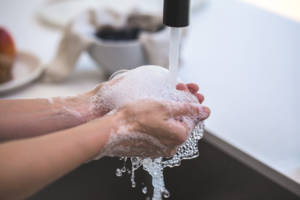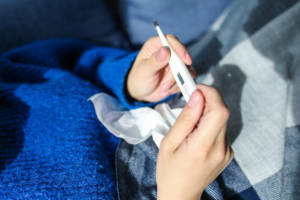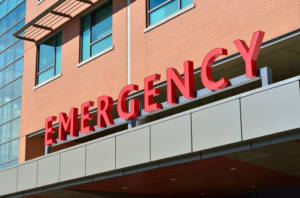The coronavirus disease (COVID-19) was first identified in China towards the end of 2019 and is known to cause high fevers and dry cough. The virus has since quickly spread to several countries, turning it into a global pandemic. With the growing number of COVID-19 cases as well as the rise in its death toll, it is now more important than ever to take preventative measures seriously to help slow the spread of this contagious disease. In order to do this, we must work collectively and mindfully to keep ourselves healthy as well as those around us who are more vulnerable, especially during this flu season. Part of preparing for the outbreaks includes reviewing your emergency game plan.
About Healthy-Aging Medical Centers of New Jersey
How does coronavirus (COVID-19) spread?
COVID-19 seems to be spreading from person to person, especially when close in proximity to. The virus spreads when the infected person coughs or sneezes via respiratory droplets. The risk of infection from the coronavirus is greater for those who have serious medical conditions (such as diabetes, heart disease, and lung disease), older adults, those who have recently been in areas with ongoing spread, and those who have been in close contact with people who have COVID-19.
7 ways to help prevent getting coronavirus
 According to the Centers of Disease Control and Prevention (CDC), following precautions will help prevent contracting COVID-19:
According to the Centers of Disease Control and Prevention (CDC), following precautions will help prevent contracting COVID-19:
- Avoid crowded areas
- Wash your hands frequently with soap and water for at least 20 seconds. If not available, use alcohol-based hand sanitizer containing at least 60% alcohol
- Avoid touching your face – including nose, eyes, and mouth if your hands aren’t clean
- Avoid being within 6 feet of people who are sick or has symptoms
- Practice social distancing
- Cough and sneeze directly into a tissue or into your elbow
- Clean and disinfect commonly touched surfaces in your home on a daily basis
In addition, it is important not to panic during this time. Buy essentials for you and your family, but also be considerate of the families after you. There are more than enough supplies to go around if people refrain from hoarding. Supplies are being restocked every day. If possible, try to avoid traveling and frequenting essential services (unless needed) that will remain open during this time.
Symptoms of coronavirus:
 According to the CDC, the following symptoms may be experienced within 2-14 days after exposure. Reported cases have symptoms ranging from mild to severe and fatal.
According to the CDC, the following symptoms may be experienced within 2-14 days after exposure. Reported cases have symptoms ranging from mild to severe and fatal.
- Fever
- Cough
- Shortness of breath
Emergency symptoms that should be given medical attention immediately include:
- consistent chest pain/pressure
- trouble breathing
- bluish lips or face

What to do if you may symptoms of COVID-19:
If you are experiencing symptoms listed above or have been exposed to the coronavirus:
- Contact your doctor immediately. He or she will determine whether or not to conduct testing for COVID-19 based on your symptoms.
- Alert the clinic before you show up to properly prepare for your arrival
- Provide key personal information including family medical history, current medications and doses, and any known allergies
- Inform your doctor of any recent travel to any area with ongoing COVID-19 spread.
Testing for coronavirus
Your doctor may take samples of your saliva, a nasal and/or throat swab that is then sent to a laboratory for testing. Results are generally available within a few days, (according to the Federal Health Department) but may become available sooner as innovative tests are currently being developed. In the event that your test comes back positive for COVID-19 and your doctor determines your case is mild enough to treat at home, you may be usually instructed to:
 self-quarantine yourself from any others in your home by staying in a different room for 14 days, only leaving to seek medical care
self-quarantine yourself from any others in your home by staying in a different room for 14 days, only leaving to seek medical care- avoid sharing personal household items such as dishes, drinking glasses, utensils, bedding, or towels with others in your home and wash the household items immediately after use
- wear a face mask
- cover your mouth and nose when coughing or sneezing using a tissue
- dispose used tissues immediately after use
- wash your hands often
- keep in contact with your doctor, alerting them ahead of time before you show up to the clinics
- avoid public transportation or rideshares to help minimize risks of spreading the virus
- monitor your symptoms regularly and contact your doctor immediately if your conditions worsen
In all cases, follow instructions given by your healthcare provider and local health department as they may vary.
Let’s get through this together. There is no more crucial time than now to cooperate as a whole to do our due diligence, remaining clean and healthy for ourselves and help protect the people around us who are more susceptible to help slow the spread of COVID-19. Besides following the steps to help prevent getting ill, it is extremely important to practice social distancing now more than ever. Thanks to advanced technology, there are alternative options of having social connections digitally through social media, facetime, and unique apps to play games with friends and family to help remain connected with our loved ones. Remember, there are other ways to maintain your health and well-being while practicing social distancing through activities, exercise, and walks outside.
We at Healthy-Aging Medical Centers of New Jersey pride in maintaining a clean and safe environment for our staff as well as patients and will remain open (by appointment only), providing essential services such as IV nutrient therapy to help boost your immune system. Schedule an appointment with us online or call 973-435-0433. We hope that you and your loved ones remain safe and healthy as we all work through these challenging times.
